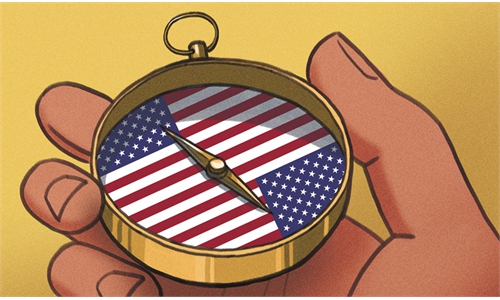
China-US Photo: GT
The Joe Biden administration has taken a string of actions to restore relations with allies. This includes upgrading the Quad meeting to a leaders' level on March 12 and sending senior officials to Japan and South Korea for "2+2" diplomatic and security talks this week. The US is attempting to tackle the so-called China challenges by reviving alliances and forming an anti-China coalition. This is, however, just wishful thinking. There are many difficulties to repair the American alliance system in Asia. It's also impossible for the alliances to evolve into an anti-China coalition. It's an embarrassing and outdated existence in today's world order.Plenty of difficulties lie ahead for the Biden administration to restore alliances. The Trump administration's vandalism of the US alliance system during its four-year tenure has aggravated centrifugal tendencies within the alliances. Many US allies have now emphasized their own strategic autonomy. They have failed to get enough sense of security within the alliance system over the past four year.
Currently, allies don't have enough trust in the US. They don't think the Biden administration has enough capabilities and resources to invest into the alliance system. They know that Biden wants to build up the alliance system as a major diplomatic tool against China. But what can Washington offer to its allies today? Washington and its allies are still squabbling over problems such as cost sharing for hosting US troops. It's fair to say it's difficult to completely restore US' alliances in four years. The US alliance system can't return to the way things were before the Trump administration.
Moreover, the US alliance system is a product of the Cold War. It was historically established to serve the US confrontation with the former Soviet Union. But the security threat that brought the US and its allies together no longer exists today. The major security threats facing the Asia-Pacific now are non-traditional ones. Since the end of the Cold War, regional integration has been strengthened, and regional organizations such as ASEAN have gained more weight. Relevant countries' need for US protection in the Asia-Pacific is declining. In fact, more countries rely on regional organizations to solve problems. This has made traditional US security alliances outdated and less influential.
The US has warned against China's "coercion and aggression" and touted China as a "threat" to its allies. Can the "China threat" be used to defend, consolidate and even further expand the US alliance system?
China cannot be the glue that binds the US alliance system together. US allies are having closer relations with China in areas that include the economy, trade, politics, diplomacy and security. This makes them reluctantly to follow the US footsteps to screw up ties with China. Maintaining stable cooperation with China is more in line with their national interests.
Some US allies gestured that they stand firmly with the US to confront China. This is not because they are loyal to the US. They instead have their own calculations and interests. They may intend to gain some benefits by cracking down on China with the US to win regional competition.
Besides, there are divergences and competition among US allies - and between the US and its allies. That is to say, the seemingly "strong" alliance system is actually quite fragile in nature.
It's impossible for the Biden administration to organize an anti-China coalition in Asia. US allies and partners in the region know better what it means if they choose to join such a coalition. It means they have to give up their gigantic interests gained from sound relationships with China, which is a great damage to their national interests. More dangerously, if there is a military clash between China and the US, they will be forced to get involved in. In the end, they will become the biggest victims.
For Asian countries, China is their immovable neighbor, while the US is only an outsider. Countries in the region know that China's rise is unstoppable. No forces can contain China's rise. The rational choice for them is to think about how to take advantage of China's rise to better serve their own development. They are unwilling to take sides between China and the US.
Asian countries can choose foes, or friends, but cannot choose neighbors. So, it's natural for them to maintain a stable and healthy relationship with China, while there is still room to discuss what kind of relationship they should have with the US - which is clearly an external power.
The US strategy to draw allies in to jointly contain China is only an illusion. But it could add difficulties for China and the US to reconcile relations. It may also increase the possibility of friction between the two countries in the future, jeopardizing world's peace and stability. The US should abandon such attempts. The US alliance system in Asia is outdated and has become a disruptive factor for regional security and stability. It should be discarded.
The author is an assistant research fellow at the China Institute of International Studies. opinion@globaltimes.com.cn



